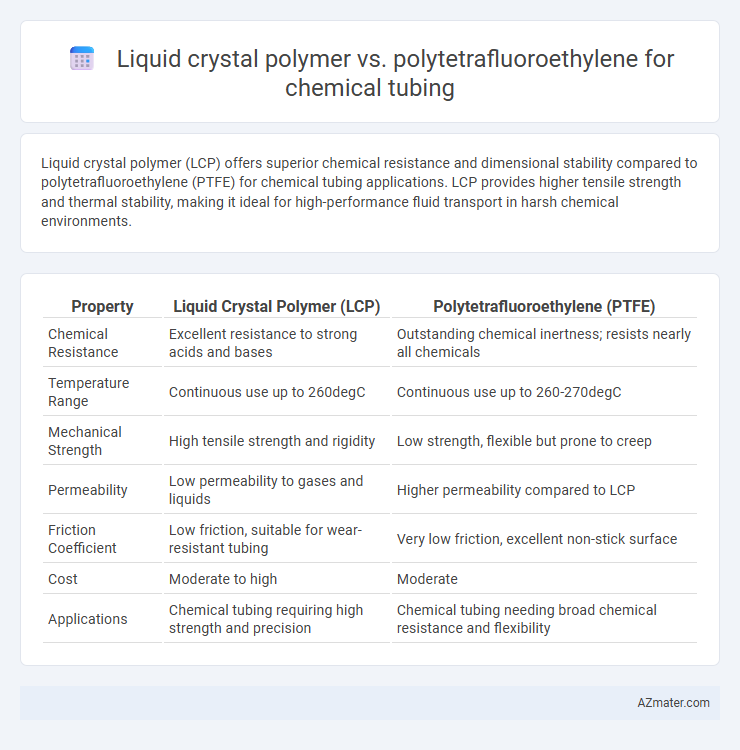Liquid crystal polymer (LCP) offers superior chemical resistance and dimensional stability compared to polytetrafluoroethylene (PTFE) for chemical tubing applications. LCP provides higher tensile strength and thermal stability, making it ideal for high-performance fluid transport in harsh chemical environments.
Table of Comparison
| Property | Liquid Crystal Polymer (LCP) | Polytetrafluoroethylene (PTFE) |
|---|---|---|
| Chemical Resistance | Excellent resistance to strong acids and bases | Outstanding chemical inertness; resists nearly all chemicals |
| Temperature Range | Continuous use up to 260degC | Continuous use up to 260-270degC |
| Mechanical Strength | High tensile strength and rigidity | Low strength, flexible but prone to creep |
| Permeability | Low permeability to gases and liquids | Higher permeability compared to LCP |
| Friction Coefficient | Low friction, suitable for wear-resistant tubing | Very low friction, excellent non-stick surface |
| Cost | Moderate to high | Moderate |
| Applications | Chemical tubing requiring high strength and precision | Chemical tubing needing broad chemical resistance and flexibility |
Overview of Liquid Crystal Polymer (LCP) and Polytetrafluoroethylene (PTFE)
Liquid Crystal Polymer (LCP) offers exceptional chemical resistance, high thermal stability up to 300degC, and impressive mechanical strength, making it ideal for precision chemical tubing in harsh environments. Polytetrafluoroethylene (PTFE) features outstanding chemical inertness, excellent non-stick properties, and a wide operating temperature range from -200degC to 260degC, commonly used in corrosive fluid applications. Both materials provide excellent durability in chemical processing, but LCP excels in structural rigidity while PTFE is preferred for flexibility and ultra-chemical resistance.
Chemical Resistance: LCP vs. PTFE
Liquid crystal polymer (LCP) offers excellent chemical resistance, effectively withstanding most acids, bases, and organic solvents, making it suitable for harsh chemical environments. Polytetrafluoroethylene (PTFE) is renowned for its superior chemical inertness, resisting nearly all chemicals, including strong acids and bases, without degradation. While both materials provide high chemical resistance, PTFE generally outperforms LCP in aggressive chemical exposure and extreme pH conditions, making PTFE the preferred choice for highly corrosive chemical tubing applications.
Mechanical Strength and Durability
Liquid crystal polymer (LCP) offers superior mechanical strength compared to polytetrafluoroethylene (PTFE), exhibiting higher tensile strength and better resistance to deformation under stress. LCP's enhanced durability stems from its crystalline structure, which provides excellent dimensional stability and resistance to wear in aggressive chemical environments. While PTFE excels in chemical inertness and temperature resistance, LCP tubing is preferred when mechanical robustness and long-term structural integrity are critical in chemical processing applications.
Temperature Tolerance Comparison
Liquid crystal polymer (LCP) tubing offers exceptional temperature tolerance, maintaining stability between -200degC and 260degC, making it ideal for high-temperature chemical applications. Polytetrafluoroethylene (PTFE) tubing withstands a broader temperature range from -200degC up to 260degC but may experience creep or deformation under continuous high temperatures. LCP's superior mechanical strength at elevated temperatures often outperforms PTFE in demanding chemical environments requiring sustained thermal resistance.
Flexibility and Ease of Fabrication
Liquid crystal polymer (LCP) offers superior flexibility and excellent fatigue resistance compared to polytetrafluoroethylene (PTFE), enabling dynamic applications in chemical tubing where repeated bending occurs. PTFE exhibits impressive chemical inertness but is less flexible and more challenging to fabricate due to its high melting point and tendency to deform under mechanical stress. LCP facilitates easier fabrication processes such as extrusion and injection molding, making it preferable for complex tubing designs requiring both chemical resistance and mechanical durability.
Permeability to Gases and Liquids
Liquid crystal polymer (LCP) exhibits significantly lower permeability to gases and liquids compared to polytetrafluoroethylene (PTFE), making it ideal for chemical tubing where barrier properties are critical. PTFE, while chemically inert and resistant to a wide range of solvents, typically allows higher gas permeation due to its microporous structure. LCP's dense, highly ordered molecular arrangement results in superior resistance to permeation, enhancing containment in aggressive chemical environments.
Applications in Chemical Tubing
Liquid crystal polymer (LCP) offers excellent chemical resistance, high temperature tolerance, and dimensional stability, making it ideal for precision chemical tubing in pharmaceutical and semiconductor industries. Polytetrafluoroethylene (PTFE) excels with superior chemical inertness and a wide temperature operating range, commonly used for aggressive chemical transfer and corrosion-resistant tubing in chemical processing and laboratory applications. Both materials provide exceptional performance, but LCP is preferred for high-strength, low-permeability tubing, while PTFE dominates in ultra-chemical-resistant flexible tubing solutions.
Cost Analysis: LCP vs. PTFE
Liquid crystal polymer (LCP) tubing generally presents higher upfront costs compared to polytetrafluoroethylene (PTFE) due to its advanced material properties and manufacturing complexity. PTFE tubing remains more cost-effective for large-scale chemical applications, offering broad chemical resistance and lower raw material expenses. However, LCP provides superior mechanical strength and chemical resistance at elevated temperatures, potentially reducing long-term maintenance and replacement costs in specialized environments.
Environmental and Safety Considerations
Liquid crystal polymer (LCP) offers superior chemical resistance and thermal stability, making it highly durable for chemical tubing applications, while exhibiting low environmental impact due to its recyclability and resistance to degradation. Polytetrafluoroethylene (PTFE) is chemically inert and non-toxic, widely preferred for harsh chemical environments, but it poses environmental concerns related to its persistence and challenges in recycling. Safety considerations favor LCP for its lower potential for toxic emissions during processing, whereas PTFE requires careful handling at high temperatures to prevent hazardous fumes.
Selecting the Optimal Material for Chemical Tubing
Liquid crystal polymer (LCP) offers exceptional chemical resistance, high tensile strength, and excellent dimensional stability, making it ideal for aggressive chemical environments where precision and durability are crucial. Polytetrafluoroethylene (PTFE) exhibits superior chemical inertness, wide temperature tolerance (-200degC to 260degC), and outstanding non-stick properties, which are essential for handling highly corrosive or reactive fluids. Selecting the optimal material depends on the specific chemical composition, operating temperature, and mechanical requirements, with LCP favored for structural applications and PTFE preferred for extreme chemical resistance and temperature versatility.

Infographic: Liquid crystal polymer vs Polytetrafluoroethylene for Chemical tubing
 azmater.com
azmater.com